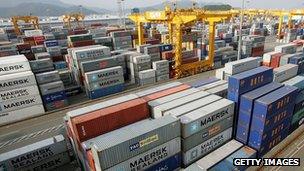IMF cuts South Korea growth forecast amid euro concerns
- Published

South Korea's export sector has been hurt by slowing global demand
The International Monetary Fund (IMF) has cut its growth forecast for South Korea, citing risks from further intensification of the eurozone crisis.
The fund said it expects a growth of 3% for this year, down from its projection of 3.25% in June.
The eurozone crisis has dented demand in the region and hurt South Korea's exports, which account for nearly half of its economic output.
The IMF said that South Korea was well placed to handle any further risks.
"In the event of a significant downside scenario, the economy has sufficient policy space to respond, especially on the fiscal side," the IMF said in a report, external on the Asian economy.
Stimulus boosts
According to data released earlier this month, South Korea's economy grew less-than-forecast in the April to June quarter, hurt by a slowdown in exports and investment.
That prompted policymakers to announce two separate stimulus measures targeted at boosting domestic demand.
The first one was a stimulus package worth $5.2bn (£3.2bn), that included tax breaks on personal incomes and purchases of homes and cars.
Then the central bank, the Bank of Korea, said it would inject 1.5tn won ($1.3bn; £825m) into banks, which will use it to provide low-interest rate loans to small businesses.
The IMF said that South Korea's central bank had room to cut interest rates in bid to further boost demand, if global issues continue to hurt growth.
However, it said that economy was likely to "bottom out during the course of 2012, regaining momentum towards the end of the year, in line with the global recovery".
The fund forecast that the South Korean economy would grow by around 4% in 2013.
- Published10 September 2012
- Published13 September 2012
- Published6 September 2012